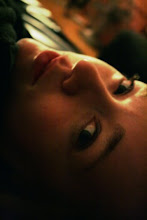 The early autumn rain is streaking my window, pattering in time with the music. Pulsing red blooms fill a glass on my desk. A candle glows by the modest stack of books.
The early autumn rain is streaking my window, pattering in time with the music. Pulsing red blooms fill a glass on my desk. A candle glows by the modest stack of books. The moment is simple. I’ve been trying to understand this promise of wholeness. These rare moments when concentration is possible almost without effort, when fragmentation seems to disappear.
Faint staccato as the rain grows harder. A dissonant piano chord.
Julia Kristeva diagnoses the modern malaise partly as the result of living in what she calls, “a piecemeal and accelerated space and time.” We have built a culture of show, a society of spectacle. We identify ourselves closely with images fed to us by capitalism -- by entertainment, advertising and propaganda -- and we lose all sense of our identity. Instead of experiencing those images that bombard us constantly as something outside of ourselves, we begin to experience these images as real. We identify so intimately with a set of images that we think they are us. They distort all sense of inner space, transgressing our boundaries. We may think we know our own desires, but often we are simply desiring what we have been told to desire, the need has been “artificially produced” (McAfee). We have become pawns of the external economy, and it is not merely our money that is being manipulated, it is our very sense of self.
“Modern man is losing his soul, but he does not know it,” Kristeva states. In her paradigm, those who wish to fight against this, must work to create an inner space, “ a secret garden, an intimate quarter…a psychic life.”
I identify strongly with this diagnosis. Easily distracted, easily fragmented, feeling pushed and pulled by desires that often defy classification into “real” and “societal pressures,” I find myself hyperventilating for lack of inner space. I spend my days sifting through an overwhelming tide of floatsam: collecting a hundred bits of news via a bewildering array of RSS feeds, monitoring human blips on the radar known as status messages, checking three inboxes, counting minutes, compiling lists and electronic calendars and bookmarking, sending, noting. After a day of this, I am incapable of holding a thought together for more than 30 seconds.
What is perhaps more sinister, I find that without constantly interrogating my desires, I too begin to identify with a set of images which I find I never consciously chose in the first place. That look, these stores, those activities, that music, this restaurant, that publication, this pose. Good enough if I told myself, I like this. But often, I don’t. Often, I’ve swallowed the hook somewhere without realizing it.
Distracted, fragmented, with an artificial sense of self.
I find it a bit ironic that culture was created as a way of imposing wholeness and order onto chaos. Now the forces of our culture are fragmenting us, the creators of culture.
I’ve been brushing up a bit on early ancient religion. All those creator myths about a god rising out of the chaos, the struggle to find a strong enough deity that could subdue the sea, the rivers, the “the womb of chaos.” The dividing of the earth, heaven and water into manageable entities. The establishing of rites to keep the chaos at bay.
And now, when my city life feels like a swirl of bits and pieces around an empty center, I find myself making my way to the cathedral downtown. Perhaps that is ultimately what I am seeking of my faith, a center. A meaningful way to step out of the meaningless flood that threatens sanity.
“If the Lord had not been my help, my soul would soon have lived in the land of silence. When I thought ‘My foot slips,’ your steadfast love, O Lord, held me up.”
Ultimately, for Kristeva, sanity can be preserved through love, through an attention to the particular, to the specific, to the individual. Through casting away empty monolithic definitions that dehumanize us.
I think the Psalmist might agree.


